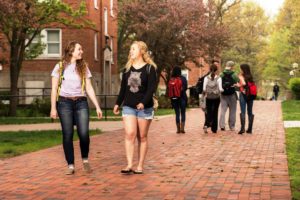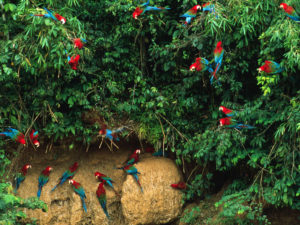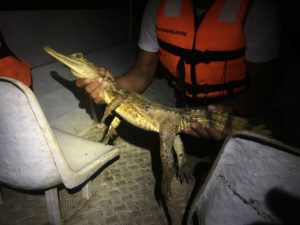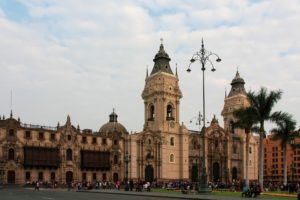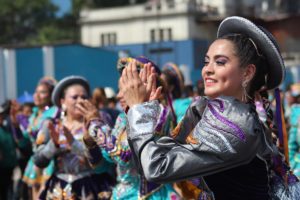Past Program Page
Please Note: This page is an archived page for a faculty-led program that has run in the past but is not currently scheduled for the upcoming round of faculty-led programs. Please note that all details provided on this page are from the last time this faculty-led program ran and are subject to change for any future renewals of this program. For more information about the status of this program, please contact the Study Abroad office or the course’s instructors.
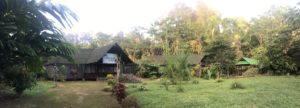
BIODIVERSITY AND CONSERVATION OF TROPICAL RAINFORESTS IN PERU
Open to All Majors, No Pre-Requisites
This course will take place during Truman’s first block summer session with on campus work before and after the work in Peru. Students in this course will learn and apply principles of scientific inquiry with emphasis on field methods in ecology while developing an understanding of the ecological dynamics of South American tropical rainforest. Students will begin this course on campus with coursework in first block summer session with course work aimed at providing background and tools to develop their research project. The class will travel as a group to Peru to spend nine days in research at Sachavacayoc Center and cultural experiences in Puerto Maldonado. Three days will be spent in the Lima area expanding knowledge on biodiversity in Peru and culture. The remaining class time will be spent on Truman’s campus completing data analysis and reports of their projects.
Where You’ll Go (Summer 2020 Plans)*
Below you will find more information about where you’ll go and and what you’ll see during this program. Please remember that this itinerary is tentative and is subject to change. More details will be shared as they become available.
*Please remember that this itinerary is tentative and subject to change. More details will be shared as they become available.
Part One: Prep Work at Truman – May 26th – June 5th, 2020
We will be meeting on Truman campus with 3-hour meetings per day (Excluding Saturday and Sunday). The purpose of these be to:
- Become familiar with the basic natural history and societal context of the region where the Sachavacayoc Research Center is located.
- Understand and practice the basic field methods to be used while on-site.
- Understand safety and security practices that are specific to the area.
- Start working on the four assignments that are part of the course-work.
- On June 5th, we’ll travel as a group to the Sachavacayoc Center in the Rainforest of Peru!
Part Two: Research at Sachavacayoc Center in the Rainforest – June 6th – 14th, 2020
This part of the program will comprise the bulk of the classwork and research experience. Work will be divided into morning, afternoon and evening sessions. During the morning and afternoon sessions students will carry out a variety of activities including site exploration and data collection for their respective investigations. The evenings will be either debriefing sessions or short lectures. The following will be the guidelines:
- Each student or group of students is responsible for one investigation
- Data collection responsibilities will be shared among all groups. Upon arrival all research leaders will be responsible for preparing the rest of the class in their data collection methods.
- Throughout the process students will also get the opportunity to interact with members of the local community of Infierno.
- Work on course assignments will continue
- We’ll travel as a group to Lima!
Here’s our tentative plan for this time:
June 5-6: Travel to Peru: US (leaving via bus from TSU to either MCI, STL or Chicago) to Lima.
June 6: Hang out in the airport (refreshments on their own in the airport) to first flight to PEM in the morning. Early morning flight to PEM. In Puerto Maldonado, Sachavacayoc Center will pick us up and bus us to the boat lauch for a boat ride to the center. Welcome and safety presentation presented by the center. Lunch and dinner provided by the center.
June 7-9: Class exercises and research in the Tambopata National Reserve around the Sachavacayoc Center. Tours of different jungle habitats guided by knowledgeable locals, boat exploration of aquatic habitats, evening presentation by a local.
June 10: The center will arrange a service opportunity in Puerto Maldonado and provide transportation.
June 11-14: Class exercises and research in the Tambopata National Reserve around the Sachavacayoc Center. Tours of different jungle habitats guided by knowledgeable locals, boat exploration of aquatic habitats, evening presentation by a local.
Part Three: In-Country Cultural Experience in Lima and the Andes – June 15th – 19th, 2020
This will be a continuation of the initial experience with the Infierno Community. Students will get the opportunity to engage with the local culture and visit historical sites and monuments in Lima. Students will get the opportunity to experience the more modern aspect of local culture as represented in the capital city of Lima. This will include:
- An afternoon and evening in the residential area of Lima
- A day tour to historical downtown Lima
- Bus tour of habitat transitional zones as we travel up and over the Andean Mountains
Here’s our tentative plan for this time:
June 15: Center will provide breakfast and transport us to the PEM airport; fly to Lima. Bus will transport us to the Pariwana Hostel in Miraflores (a municipality in Lima). Instructors will provide a walking tour of Miraflores. Students will have opportunity to curio shop and explore on their own.
June 16: Breakfast at Pariwana. Store luggage at Pariwana (may be a fee assocatied with this). Begin bus tour of biome diversity traveling up and over an Andes Mountain using the Carretera Central (Central Highway; National Route 22). Lunch in Tamara and stay overnight in La Merced at Camp Kimo.
June 17: Breakfast and walking tour of forest and coffee plantation. Travel back to Lima and lodge in Pariwana.
June 18: Breakfast at Pariwana. Bus transport to downtown Lima for a walking tour of the city; visit the National Museum. Students will have opportunity to shop. Lunch and dinner on their own. Bus will take us to the airport in the evening for a the night flight (midnight or later) flight to US.
June 19: Arrive in US (meals provided by airline and students can purchase food in the airports). TSU bus pick us up from final airport and bring us to campus.
Part Four: Returning to Truman and Completing Assignnments – June 19th – 26th, 2020
- Research project Technical Report
- Literature synthesis paper: Should include reflections on the on-site discussion/ presentation
What You’ll Study
Course Name: Biodiversity and Conservation of Tropical Rainforests
Course Number: INT 301
Credits: 4.0
Term & Dates: Summer 2020 Term, May 26th – June 26th
Pre-Requisites: Open to All Majors, No Prerequisites
Degree Fulfillments: Satisfies LSP Intercultural Perspectives Requirement & Counts as Biology elective hours
Click Here to See the Tentative Course Syllabus.
Course Objectives
- Identifying mechanistic and materialistic processes responsible for the natural world’s attributes.
- Investigating these processes by developing appropriate research questions and hypotheses.
- Planning and executing investigations based on these questions and hypothesis
- Experiencing a variety of data collection methods in field settings
- Analyzing data collected using a variety of methods and tools
- Presenting and discussing scientific interpretation based on data analysis.
- Discuss the appropriateness of scientific evidence.
- Discuss the importance a scientific perspective in the quality of human life and the impact on our biosphere
The second goal of this course is to understand the complex ecological dynamics that make up the tropical rainforest ecosystem. To achieve this, students will have first-hand experience in at a research station/facility located in the Amazon rainforest. During this time students will have the opportunity to
- Analyze and describe the variety of microhabitats that make up a tropical rainforest ecosystem through on-site observation, exploration and investigation.
- Explain different aspects of rainforest ecological dynamics by carrying out off-site literature syntheses and on-site investigations.
The third goal of the course is to provide opportunities for students to become familiar with the rationale behind conservation initiatives with emphasis in the local area. This will include discussing education processes as well as local and global social and economic dynamics.
- Discuss the need for conservation initiatives with specific emphasis on tropical rainforests.
- Analyze and discuss the role and impact of community-based conservation approaches, including participatory education.
- Discuss the role of scientific inquiry as part of the conservation biology and education processes.
Finally, students will have the opportunity to engage and explore different aspects of the local culture including country-wide social and cultural dynamics, both past and present. This will include
- Interactions with the local community in order to develop an understanding of its recent past and current history from a cultural and economic perspective
- Interaction and exploration with the multicultural Peruvian heritage through a multi-stop, overnight trip from the Lima coastline, over the Andes and into the cloud forest east of the mountains.
- A brief overview and exposure to the modern aspects of local culture in the city of Lima.
Course Requirements
Core topics
- Basic statistics and analysis tools (including spreadsheets)
- Sampling, data collection and analysis.
- Rainforest ecology
Suggested Elective topics (based on resources and interest)
- Avian diversity and distribution
- Human impact on the Amazon
- Mammal diversity and distribution
- Insect diversity and distribution
- Community based conservation
- Plant diversity and distribution
- Reptile & amphibian diversity and distribution
- Ecosystem dynamcis
Primary Course Assignments
Students will complete 5 assignments:
- Report of habitat assessments (individual)
- Research project (group)
- Literature synthesis (individual)
- Class discussion (group)
- Reflective journal (individual)
Habitat Assessments
As a class, we will visit a number of different habitats. As a class we will collect a number of different types of data to assess each habitat. Each student is responsible for collecting data and sharing the data collected for this class project. With the shared data, each student will assess the data to describe each habitat. This assignment will include a written report that describes and compares the different habitats.
Research project (group)
Students will plan and carry out one research of their own, they will be responsible for designing the investigation, collection and analysis of data and will conclude with a presentation of their findings. This project will be conducted in groups of 2-3. Data collection responsibilities will be shared among all class participants. In essence each group is responsible for one project, but data collection responsibilities are shared by the class as part of the field experience. This assignment will include a written proposal, a presentation in Peru reporting progress, and final technical report.
Literature synthesis (individual)
Students will be divided into 4 groups based on the elective topics selected. Each student will be responsible for a literature synthesis paper based on a topic of their interest (assignment 2) and each group will be responsible for leading an evening on-site discussion on their synthesis papers (assignment 3).
Literature synthesis paper (individual)
Students will select a topic of their personal interest and carry out a review and synthesis of existing literature. They will then write a paper that either provides an argument on a controversial issue, addresses importance or explains the significance of the topic within the context of the course objectives.
Class presentation/discussion (group)
Students will be divided into 4 groups based on the elective topics selected and each group will be responsible for leading an evening on-site discussion on their synthesis papers. There is no prescribed format for the discussion. Groups may elect to have a presentation/lecture, experiential activity, class discussion, debate, etc. However, the outline of the plan should be discussed with the instructors prior to departure in order to ensure it satisfies the requirements of the course.
Reflective Journal
Reflection leads to a deeper understanding of any human experience. Keeping a reflective journal will allow you to document and engage what you are exposed to as well as extract deeper meaning of both the events, yourself and the interplay that arises from this. All students will keep a Field Journal, this includes daily personal entries. You will also be assigned specific journaling entries that address course themes from the class readings and course discussions. This journal will be evaluated for the in-depth quality of the reflections contained within.
Participation points
It is expected that students:
- Arrive on time and fully participate in all activities in a positive way.
- Conduct research in an ethical manner with consideration for the community and the environment
- Contribute actively, positively and respectfully in all group activities and discussions.
- It is also expected that you respect the local people and their customs and a good representative of your school and country.
What You’ll Pay (Summer 2020 Costs)
TOTAL COST ON STUDENT BILL: $4,474.50
Study Abroad Enrollment Fee: $1,298.00
Calculated at $324.50 per credit x 4 credits
Study Abroad Course Fee: $72.00
Calculated at $18.00 per credit x 4 credits
Study Abroad Insurance Fee: $38.00
Calculated at $38.00 per month x 1 months
Study Abroad Travel Fee: $2,409.00
Including: International Airfare, Lima and Andes Bus Tour, Accommodations at Research Center, Lima, and Andes, Contingency Fund, Instructor Costs
Study Abroad Housing Fee: $670.00
Including: Accommodations and Meals at Research Center, Hostels in Lima and Andes, Several group meals
PAYMENT SCHEDULE
Due |
Amount |
|
|---|---|---|
Early Deposit* |
11/15/2019 |
$200.00 |
OR Regular Deposit* |
1/20/2020 |
$200.00 |
Payment 1 |
2/20/2020 |
$2,137.25 |
Payment 2 |
3/20/2020 |
$2,137.25 |
*Early deposit is required for consideration for Foundation Scholarships. Early Deposits received before 11/15/2019 will be refundable until 1/20/2020.
Your Instructor
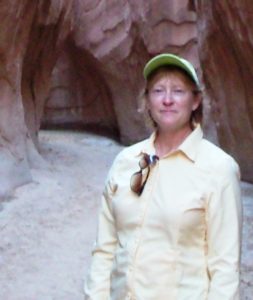
Dr. Stephanie Foré
Professor of Biology
sfore@truman.edu | Magruder Hall 3026
http://sfore.sites.truman.edu
Dr. Stephanie Foré is passionate about nature and the study of living things. She is eager to share this passion and believes that experiencing nature through research brings book-learning to life. She currently has an active research lab in which she mentors undergraduate research that often leads to presentation at conferences and publication. She has been nominated several times for Truman’s Research Mentor of the year. In her free time, she serves her country as a Wilderness Volunteer maintaining trails in America’s wild lands.
